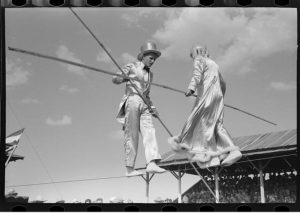When I was growing up Tennis always had a bit of style to it–a special veneer. A sense of intended, or unintended, civility. It almost had a sense of colonial elitism; the unfortunate whiff of exclusion. Thank goodness those days are gone. Now character has entered the game and drama has become part and parcel of modern tennis.
That said, yesterday, I went to see my 13 year old play tennis on the courts and I witnessed, on the surrounding courts not passion, but hysteria.
To my left two young women were engaged in grunting so loud that it was disturbing the other players. On a parallel court a 12 year old threw his racket to the ground and started to pound the court hysterically after losing a match.
In each instance nothing was done. The coaches and the parents let it slide. The behavior, it seemed, was accepted as part of the new, emerging, culture.
I could overhear one parent saying, “Well, he plays wonderfully, he’s a star. I try to discipline him, but I keep in mind how good he is.”
I shook my head. I was stunned. This is a slippery slope.
How much are we willing to tolerate in the name of competence?
In the workplace I’ve often witnessed certain characters that feel like they can get away with pretty much anything because they are the ‘stars.’ Keeping the prima donna phenomenon in check is the responsibility of all leaders, coaches, mentors, supervisors, and parents….
The occasional attention calling tennis-grunt is fine, but self-centered dramaturgy creates an atmosphere of ego rather than cooperation. Drama, rather than genuine focus.
It’s important that leaders make sure that the people on their team are celebrated for there individual efforts, but it’s essential to avoid the world of obnoxious tennis grunts. We can’t get wrapped up in the dramaturgic behavior of prima donna’s that have been allowed take center stage in our culture.
After all, we all can’t afford to be spoiled 12 years-olds at the workplace. It is of course, only a game.



